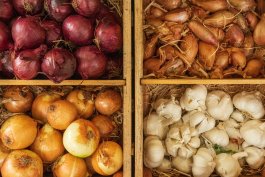The humble onion is one of the most popular vegetables in the world. It comes in so many colors and flavors—it’s a cook’s dream and a gardener’s delight! And with so many uses for onions, you should know the best tips for handling onions.
Right now, someone is chopping up onions for an omelet. Or preparing a batch of onion rings. Or patiently stirring the pan as the onions caramelize. Onions are a staple in people’s diets the world over—and they have been for thousands of years!
When harvesting onions from your garden, carefully pull or dig your onions out of the ground and gently brush or shake the extra soil off the bulbs. But wait! They’re not ready to store yet. Onions need a bit of time to dry out before they’re ready to be stored. Trim and store them too early, and you’re opening your harvest to the hazards of infection.
Here are some best tips for handling onions:

Keep them out of the refrigerator, unless …
I know the urge is to put your onions in the refrigerator once harvested (or even the onions you haul home from the grocery store). But, just don’t do it. Fresh onions should be stored in a cool, dry, ventilated area … and away from any direct sunlight—such as on your countertop in a basket or in the pantry. Just remember cool, dry, and ventilated! Your onions can last up to a few months when stored this way. As with all things, there are exceptions. Onions, once cooked, can of course be stored in the fridge. Plus, onions that have been cut in preparation for a dish can be stored in air-tight containers in your refrigerator until you’re ready to cook. And fresh spring onions can be stored, wrapped individually in paper towels, in the refrigerator to prolong shelf life.
Don’t store onions near potatoes.
Gardeners are, rightfully so, always concerned about companion planting—which plants complement each other in the garden and which should stay away from each other. Well, it’s no different when it comes to handling and storing your food. Some items can be stored together—onions and garlic are alright together—but others should be stored separately. For example, onions and potatoes shouldn’t be stored near each other. Onions produce ethylene gas, which hastens the ripening of potatoes and can cause the potatoes to rot and spoil. And potatoes have a high moisture content that can cause onions to get mushy and leak.
Avoid wrapping or smothering your onions.
Fresh onions need space! Don’t wrap them in plastic, and don’t place onions in brown paper bags either. When fresh, they really need cool, dry, ventilated areas when being stored. The only time you should wrap onions is when they’ve already been cut or have been cooked. Otherwise, smothering fresh onions is a mistake—it will trap moisture and accelerate rot. Rather, cooked onions and apples are the ones that should be smothering a delicious pork chop, for example.
How to avoid crying when cutting onions.
When you cut an onion, the plant releases a very volatile gas that irritates your eyes. Maybe you’ve tried a few techniques—running the onion under cold water; cutting the onion under water (awkward!); burning a candle nearby to burn off the sulfoxide; running your stove vent; chewing gum while you’re cutting; wearing swim goggles (awkward, but effective); wearing contact lenses to prevent the gas from irritating your eyes—to avoid crying while cutting onions. The real secret lies in knowing one end of the onion from another. The cone shape at one end is the top of the onion; the button-like shape at the other end is the root end. It’s the root end that’s the root cause of your crying, so you need to remove it if you really would rather not have your eyes water while you’re cutting onions.
How to cut, dice, and chop onions the right way.
When cutting, dicing, or chopping onions, the key is to end up with uniform-sized pieces. Cooking onions will produce more consistent results when all the pieces are the same size. It’s less important when you’re cutting onions for use in a raw salad, but it’s still a better experience for your mouth if the pieces are of relatively equal size. To get the best results, cut onions from pole to pole, not across the equator.
Do you want to start growing and enjoying onions? It’s so easy, and you will find many ways to use your onions! Check out our The Outstanding Onion Gardening Guide to learn everything you need to know about growing, tips for handling onions, storing, and enjoying onions! And this onion gardening guide has lots of easy-to-make and tasty recipes for you—check it out now!
What else would you like to know about tips for handling onions? Have a tip you want to share? Please leave your questions and comments below.


 Previous
Previous

